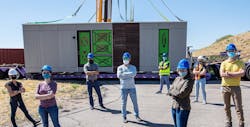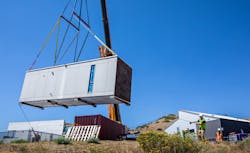Wells Fargo Incubator Helps Housing Innovators Survive the Startup Stage
An innovative startup might have an industry-disrupting idea for improving the efficiency or affordability of homes. But the company first has to survive what entrepreneurs call the valley of death: the cash-draining period between taking the first developmental steps and becoming commercially viable.
That’s where the Wells Fargo Innovation Incubator comes in.
Launched in 2014, the Innovation Incubator, or IN2 as it dubs itself, helps bring to market high-impact, low-carbon solutions in residential and commercial buildings and in agriculture.
“We try to speed the path to market for early-stage startups that haven’t yet proven out their technology,” says Trish Cozart, program manager of IN2, which is operated and managed by the National Renewable Energy Laboratory (NREL), the Colorado-based federal laboratory dedicated to the research, development, and commercial deployment of renewable energy and energy efficiency technologies.
Funding the Wells Fargo Innovation Incubator
While NREL provides the incubator’s participants with technical expertise, Wells Fargo provides the incubator’s funds: $50 million to date. The San Francisco-based financial services company focuses its philanthropic efforts on affordable housing, financial health, and small business. In 2019, Wells Fargo announced it would give $1 billion toward addressing the nation’s housing affordability crisis through 2025.
Each IN2 participant gets $250,000 in non-dilutive funding, so they don’t have to give up any ownership of their companies. Of that amount, $200,000 comes in the form of support in the NREL laboratory, where each startup collaborates with an NREL researcher to develop a project, such as testing the company’s product.
“NREL helps the companies do that with multimillion-dollar equipment they would never dream of getting to use,” Cozart says.
The housing startups get the rest of the award in cash. They might use that $50,000 to build a piece of equipment, for instance.
Meet the housing startups in the Wells Fargo Innovation Incubator
Of the 46 IN2 companies so far, eight have pursued housing innovations. They include Blokable, a modular builder that produces high-quality, low-cost housing. Blokable constructed part of an apartment block on NREL’s campus in Golden, Colorado, to test and evaluate its energy efficiency, including waste reduction in manufacturing.
In terms of taking an idea from concept to market, Blokable represents a clear IN2 success story. The Seattle company recently completed a 12-unit affordable housing development in Washington.
Another IN2 housing participant, Pre Framing, has devised a prefabricated solution that it says allows builders to construct standard and gable walls 10 times faster than traditional methods, with less waste and greater precision. Pre Framing’s collaboration with IN2 has involved, among other things, creating a 3D visualization training tool to help workers understand how to assemble the company’s prefab walls.
Other IN2 housing companies include Span, whose smart electrical panel lets homeowners monitor and control their energy use, and EnKoat, which has devised a wall coating that reduces heating and cooling costs.
IN2 will announce its next cohort of five housing startups on May 6.
“We’re looking at the places where we can have the most impact,” Cozart says. Some of the most obvious places, she adds, are buildings, which altogether consume 40 percent of the nation’s energy—about half of that by residential buildings.
“So technological innovations in this area can have a huge impact on energy consumption and on affordability,” Cozart says. “We have a lot of technology out there that can help solve some problems right away.”
First, however, these startups have to survive the incubator’s rigorous selection process. IN2 identifies potential applicants by asking for recommendations from more than 60 partner organizations: incubators, accelerators, and universities across the nation.
That slate of companies then gets reviewed by three boards. NREL’s board of researchers determines whether the companies would make a good technical fit for the incubator; this process cuts down the candidate pool by half. Next, a board of Wells Fargo executives and senior managers looks at the companies through a philanthropic lens to ensure their solutions can deliver the desired impact. And last, an external board of industry experts—representing organizations ranging from DuPont and Walmart to the Housing Innovation Alliance and the Modular Building Institute—make the final selections.
The average IN2 engagement lasts about a year, but the incubator’s relationship with these startups continues long afterward. “We don’t just give them money; we continue to look for ways to help them succeed,” Cozart says.
While 90 percent of startups fail, more than 55 percent of IN2 companies leave the incubator commercially ready.


